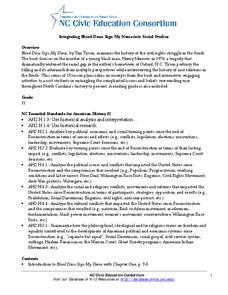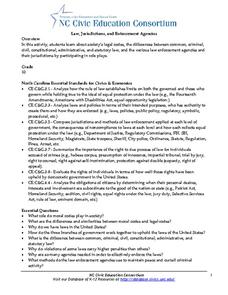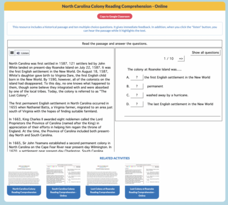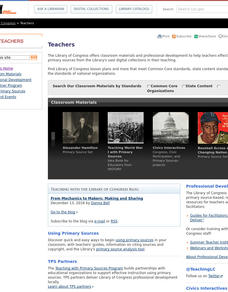University of North Carolina
Integrating Blood Done Sign My Name into Social Studies
Tim Tyson's Blood Done Sign My Name is the anchor text in a unit study of the history of race relations and the civil rights struggle in the South. The 11 lessons are richly detailed, and the unit deserves a space in your curriculum...
Core Knowledge Foundation
Colonial America Tell It Again!™ Read-Aloud Anthology
A read-aloud anthology explores Colonial America. Third graders listen to informational texts, discuss what they heard, and participate in extension activities and writing. Take-home materials, assessments, and remediation opportunities...
Carolina K-12
Exploring the Electoral College
Does your vote really count? This activity helps young voters learn about the electoral college through a TED talk, a helpful handout, discussion prompts, and then a role-playing activity that has participants simulating...
Carolina K-12
“Stealing a Little Freedom”: Slave Runaways in North Carolina
As part of a study of slavery during the US colonial period, class members investigate why enslaved people ran away, the risks inherent in escaping, and the methods used to locate them.
Carolina K-12
Law, Jurisdictions, and Enforcement Agencies
How do you determine what law enforcement agency has jurisdiction when a crime has been committed? That's the challenge facing class members in this role-play activity.
Mr. Nussbaum
North Carolina Colony
Ten multiple-choice questions make up an interactive practice designed to increase reading comprehension. The topic of the informational reading is the North Carolina Colony.
Carolina K-12
The Results are In! Examining Our First Vote Election
The 2016 election is over, and now it's time to dig in to some data! An activity revolves around data gathered from the First Vote Project in North Carolina wherein thousands of students voted. After diving in to the data using...
Curated OER
Three Regions of North Carolina
Fourth graders investigate the three regions of North Carolina using works of art.
Curated OER
Tobacco in North Carolina
Fourth graders examine the depiction of North Carolina tobacco farms in several photographs. They work in small groups to prepare an argument for a class debate and create promotional signs to advertise their point of view about tobacco...
Curated OER
Let's Take A Trip
Students use the Internet to find the distance from their hometown to other cities in North Carolina. They see how many miles they can travel in one day and how long it take them to get there. They do a journaling activity about points...
Curated OER
North Carolina Symbols Word Search
In this word search worksheet, students read the words related to North Carolina. Students locate the 22 words within the word search puzzle.
Curated OER
North Carolina Vocabulary
In this vocabulary activity worksheet, students read the statements about North Carolina and use the terms in the box to complete the 10 statements.
Curated OER
Colonial North Carolina
Eighth graders are introduced to the conditions of North Carolina when it was still a colony. Using the internet, they research the political, religious and economic problems the colony faced and how they dealt with them. They also...
Curated OER
A Different Point of View
Fourth graders imagine what North Carolina looks like from the air. Looking at a map, they list the different kinds of views we might find, (i.e., beach, mountains, cities, farms, etc.) then attempt to draw their own version of a map.
Curated OER
North Carolina Map
In this state maps instructional activity, students identify the state map of North Carolina. Students fill in the state capital, the major cities, and other state attractions.
Curated OER
The New Deal: North Carolina's Reconstruction
Eighth graders study North Carolina's reconstruction through an interdisciplinary project that emcompasses social studies, language arts, visual art, music, and technology.
Curated OER
North Carolina Historical Sites
Eighth graders design and create a tourist brochure for North Carolina historical sites. They research North Carolina, find and scan pictures for their brochure, use ClarisWorks to form the text, print, display and use constructive...
Curated OER
Craft Revival: Shaping Western North Carolina Past and Present
Students gain an understanding of a resident's lifestyle of North Carolina. They analyze five objects the are representation of the culture of North Carolina. Critical thinking skills are used to describe the geography through using the...
Curated OER
What Kind of Santa Claus You Are.
Students use a photograph analysis sheet to analyze primary sources (photographs) of the Great Depression in small groups. They then write a poem about kids in the Depression Era that reflects their comprehension of the period and...
Curated OER
The Great Depression in North Carolina: Experiences of the People
Students explore the Great Depression. In this research skills lesson, students interpret historical evidence presented in primary and secondary sources. Students write their own WPA interviews after they have examined...
Stanford University
The 1898 North Carolina Election
Pupils discuss why the Democrats defeated the Fusion ticket in the 1898 North Carolina election. In this content area reading instructional activity, learners explore three primary documents and answer guiding questions that help them...
Curated OER
Land of Milk and Honey Relocated or Not (Lesson 3)
Fourth graders practice their research skills. In this North Carolina history lesson, 4th graders examine primary resources and draw conclusions regarding the birth of the city of New Bern, North Carolina.
Curated OER
North Carolina Salt Dough Map Social Studies Project
In this lesson plan, North Carolina Salt Dough Map, 4th graders create a salt dough map of North Carolina, Students use dough to form the shape of the state of North Carolina. Students label the three regions of North Carolina and all...
Curated OER
Shifting Coastlines
Students study North Carolina's changing coastline during the Paleoindian and Archaic periods and determine the positions of the coastline at different times and decide what types of archaeological information has been lost due to rising...

























